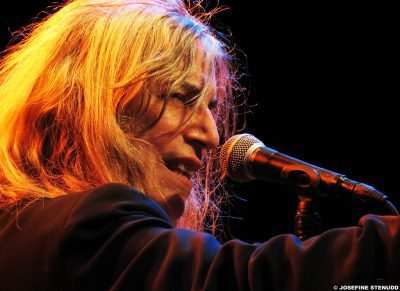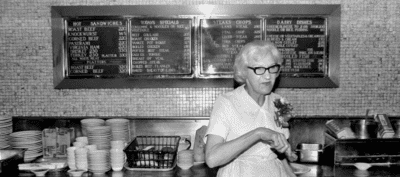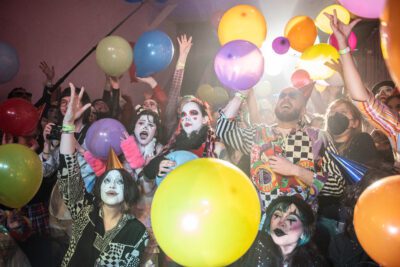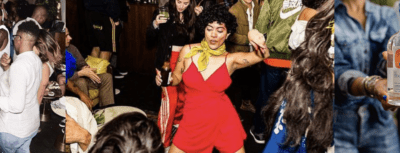Interview with 2018 NBCC Non-Fiction Award Finalist Masha Gessen
For the past four years, the National Book Critics Circle has partnered with The New School’s MFA Creative Writing program, allowing the students to interview each of the NBCC Awards Finalists. In addition to building excitement for the Awards Finalist Reading and Ceremony held at the New School March 14th-15th, these interviews have built an intergenerational bridge between the writers of today and tomorrow.
This year, as part of the ongoing collaboration, and in support of the NBCC’s conversation about reading, criticism, and literature that extends from the local to the national, Brooklyn Magazine will publish and promote the interviews between NBCC Finalists and the current students of The New School.
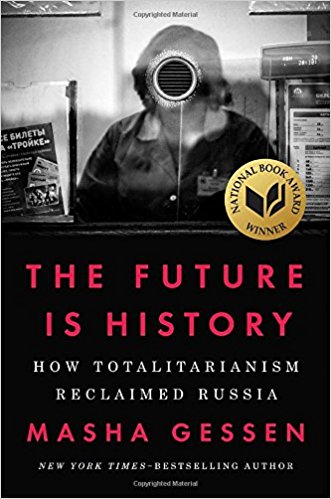
This book intertwines stories of seven protagonists, which is akin to a novel, and has contextual information, which is similar to a textbook, but the tone overall feels very personal, like you’re relating this epic story. What was your process for coming up with this structure?
I usually do this with books: I know what my objectives are and I know what the topic is, and then I’m just reporting. I walk around for a bit, literally, bike and walk, and then suddenly, I get an idea of what it should be, what the structure is. So I can’t tell you how I came up with this, but I can tell you what my objectives were. The book is really about trauma, but I didn’t want to say the word “trauma.” I wanted to make people feel the trauma, and in order for people to feel the trauma but also learn, I needed to write a book in a way that’s very different from the way nonfiction books are generally written. There’s nothing wrong with the way nonfiction books are generated. I’ve written nine, and most of them have been your standard nonfiction book. My next one will not be structured like this, like a novel. But the way I think about it is that nonfiction books are usually told from the middle distance. The narrator is somewhere in the vicinity of their characters, but on the outside, right? So, you get to look at the characters from the outside, and you also get to observe events up close, but not too close, not from the inside.
I wanted to do what novels do, and novels do zero distance and bird’s eye distance, but not middle distance, usually. In a novel, you have the interior view and you have the bird’s eye view. So that’s what I tried to do. The parts that you referred to as a textbook, I think of them as the war parts in War and Peace. Where it’s like the movement of troops and the other parts are like the peace parts. I’m not comparing myself to Tolstoy, I’m just saying that that’s like the ultimate way to think about a novel, is to think in shifting interior and bird’s eye view frames. For example, none of my protagonists are ever quoted, because you’re inside their heads, and none of them is described. None of them is physically described for the very reason that I didn’t want you to ever step out of the inside of their heads, unless it was to zoom way out. That was my objective.
In terms of having a distanced view of something, you talk a lot about how Western scholars tend to define terms in ways that are not necessarily correct. I’m thinking particularly in terms of the fall of the Soviet Union and also these different definitions and descriptions of totalitarianism. How do you think your experience helps shape your notions of these concepts?
I’m not saying that Western scholars don’t define these things correctly. In fact, I wouldn’t be able to write a book if it weren’t for the work of Western scholars. I think part of the book is an intellectual history. So I trace different ideas and different ways of thinking about these phenomena, and try to build on them. I’m by no means saying that people are wrong about the way that they interpreted the fall of the Soviet Union. I think that there are a number of ways to tell that story. I think each of those ways has its useful elements and its flaws. Some of them are more useful than others, but I didn’t actually cite any models that I think are wrong. I just think they’re all differently useful, as for the fall of the Soviet Union. As for totalitarianism, that’s a somewhat different story. That’s an evolving concept. I’m trying to make an argument for viewing what’s happening in Russia now as a kind of totalitarian. But most of the writing about totalitarianism has concerned the establishment of the totalitarian regime. Whereas the case that I’m making is that I’m looking at the lived experience of totalitarianism, and that the conditions for creating the lived experience of totalitarianism are distinct. They can be the same as the conditions for establishing a totalitarian regime, but they can also be different. And in this particular case, we’re not watching the establishment of a totalitarian regime. But it is the lived experience of totalitarianism. And so that’s why I have that long chapter where I go through all the different definitions of totalitarianism, the point is not to argue with them but to sort of say, look, this is how the definition of totalitarianism has evolved, and this is me making the case for applying this very important concept to this thing that I’m trying to describe.
How did you decide on the four main young characters that are talked about in this book? You’ve mentioned previously that they all have an articulated relationship with power, but don’t directly have power themselves. I would say, too, that they all have an interesting relationship with politics that fluctuates. They’re all forced to confront politics in often very personal ways. How did you decide on these people? What was your process for researching them?
I thought about what I wanted to highlight. There’s an idea in nonfiction, “writing of the representative character,” which I think is a terrible idea. It misrepresents the way humanity works. Nobody represents other people, and looking for representative characters, especially characters that represent an entire society is just an inhuman way of approaching reporting. I’m heading off a criticism that I’ve heard that these people are not representative. But I didn’t think of them as representative. I thought of them as people whose stories would allow me to highlight certain things that I wanted to tell about. And so I wanted to tell about the class stratification about Soviet and post-Soviet societies, so I really needed people from different socioeconomic classes. Lyosha grew up pretty close to poverty. So there’s Lyosha all the way up to Seryozha who grew up in extreme privilege, the ultimate privilege that you can have in Soviet society and post-Soviet society. And I needed somebody who had proximity to post-Soviet power, so that’s where Zhanna comes in.
On the other hand, I wanted people whose lives had changed drastically as a result of the crackdown. So by definition these were not going to be pro-Putin Russians. Their oppositional politics are very different, and I wanted that, but I wanted all of them to be able to reflect on that point in 2012, as a turning point in their lives. I wanted one of them to be gay, because I needed to write about the anti-gay campaign. But when I first started out, one of the people that I was going to talk to was somebody who still lives there, and I realized it was going to be too hard for me to get him to be as open as I needed him to be for this book. I also have this obsession with people who were children in the 1990s. So that’s how the age was determined.
Once I had these criteria in my mind, that’s when I started sifting through my mental Rolodex, and thinking of all the people I know, and who might be a) interesting and b) interested, because an important criteria is that they had to be people who would be willing to sit down with me for endless hours and answer really bizarre questions, because my goal was to write this from inside their heads. Not a lot of people actually have great tolerance for it. And the way it ended up happening was that it was an exercise they were really invested in. It was a kind of reckoning at a difficult time in their lives, and so it was almost like therapy, these interviews. They all have feelings, because it’s a pretty odd, strange, and huge demand to make on somebody.
You talk about the crackdown on gay people, but towards the beginning of the book, one of the first mentions of gay people in Russia is the gay film festival of 1991. It’s such an interesting juxtaposition to see that and then later see Lyosha basically forced out of Russia because of his sexuality.
The contrast is huge. That’s part of what the book is about. It traces the route from that incredibly promising, almost shocking openness to people having to flee for their lives.
I actually organized that film festival, and like Lyosha I had to flee the country in 2013, about six months before Lyosha did. So that story I know it intimately. The first time I went to Moscow in March 1991 was in part to talk to activists who had asked me to help organize this festival, and I thought, “That’s insane! There’s no way that they’re going to be allowed to get away with it,” and they were. I had had this incredible high of crossing the border with all these films and being able to announce these films from the stage, at the movie theater in Moscow, and it was incredible. It felt so heady. It felt like the future was ours. And then a mere 22 years later, there I was hightailing it out of Russia.
Social media plays a really important part of the protesting process. How do you think social media has shaped the landscape of Russia today?
I don’t think it’s shaped the landscape. I think it’s actually a mistake to put social media that way. I think it’s an amplification. It makes things more audible and it speeds things up. But it does not create the landscape, and it does not create connections that don’t exist on the planet. It can amplify them.
In the book there’s also a large section that talks about privilege, and privilege is such a hot topic in the United States now. I was wondering if you had any opinions about privilege and the way that it’s discussed and thought about in Russia and during the Soviet Union versus the way that it’s talked about today in Western culture.
I spend a fair amount of time in the book on privilege because I feel like it deserves a lot of attention. There’s a misconception in the United States that the Soviet Union was a classless society and an egalitarian society and it was anything but. That misconception has been actually weaponized by Kremlin propaganda very effectively, both inside and outside of Russia, because there’s this idea that inequality was created by economic reforms of the 1990s, and that’s crazy. Inequality was baked into Soviet society, it was incredibly regimented, and that’s why I spend so much time explaining just how segmented it was, and how inequality was a very important instrument of social and political control. Post-Soviet inequality has a lot more in common with American inequality than Soviet inequality did. But Russian inequality has deep structural roots in Soviet inequality, just as contemporary American inequality has these deep structural roots in historical inequality. Talking about inequality without talking about history is stupid, and a dead-end conversation.
You have to have a historical context.
It’s not just that you have to have an historical context. You can’t understand inequality unless you understand how Russian inequality stems from Soviet class structure, or how American inequality stems from institutions of slavery and segregation, and all the economic mechanisms that were created to maintain racial inequality and gender inequality.
So where were you in the process of writing and publishing this book when Trump was running for and elected president? What was it like knowing how relevant this book would become in the United States?
So, I finished writing it in September 2016, and it was pretty bizarre, because that basically means that I started writing it around the start of the campaign. I don’t know how it works for other writers, but I know for a lot of people it works in a fairly similar way, where first you write slowly, and then the last half of the book, when all the research is done and the structure’s in place, it’s almost like a surgical process. I write as fast as I physically can for the second half of the book, because it’s all there, you just have to get the words down and in the correct order. That was the journey from the beginning of July, till the middle of September 2016—that’s both conventions and then the debates. I was done with that very intense surgical process, and had it on my desk and thought, “Oh my God. I just did a lot of relevant research.” I was convinced that Trump was going to win all along, not because I’m such a brilliant predictor of things, but because that’s what was preoccupying me, and because I think once that thing appears on the horizon, it’s going to happen. All this thinking about totalitarianism was in some ways going to become relevant, which was bizarre, because I thought I was writing a really niche book.
You might also like 

















